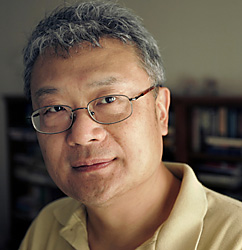Ha Jin’s new novel, “A Map of Betrayal”, tells the story of a Chinese spy living in America. Ron Charles reviews it for The Washington Post:
Ha Jin’s new novel, “A Map of Betrayal,” looks toward China. The action, as might be expected from this famously modulated writer, is more Walter Mitty than Walter Raleigh. Jin’s anti-hero is Gary Shang, “the biggest Chinese spy ever caught in North America.” If that superlative conjures up an underwear model flying a helicopter through the Lincoln Tunnel and dispatching enemies with toxic lip balm, you need to calm down right now. “A Map of Betrayal” is the perfect thriller for the reader with a heart condition. Gary is a torpid man who works as a translator for the CIA in the Washington area. He’s neither shaken nor stirred.
This tale of betrayals and disappointments is a natural one for Ha Jin to publish. As a teenager, he served in the People’s Liberation Army and survived the Cultural Revolution. But he watched the Tiananmen Square massacre from Brandeis University, where he was finishing a dissertation on American literature. Disillusioned by his country, he never returned. “To preserve the integrity of my work,” he said several years ago, “I had no choice but to write in English.” That has proved a spectacularly successful choice. He’s since won a National Book Award and two PEN/Faulkner awards.
See also reviews from The Chicago Tribune, The New York Times, and NPR.
In 2009, Sarah Fay at Paris Review published a lengthy interview with Ha Jin, who says his writing career began with the June 4th, 1989 military crackdown on protesters in Beijing. Jin discusses his early years in America, launching his career as a writer, and his complicated relationship with his home country:
INTERVIEWER
How long was it before you returned?
JIN
I haven’t returned.
INTERVIEWER
Never?
JIN
Never to mainland China. I’ve only been to Taiwan and Hong Kong. In the beginning, I was very eager to go back to see friends and family. I tried so hard. But for seven years I couldn’t get my passport renewed. I couldn’t travel outside of the States. Then I became a citizen, and I got jaded. Imagine your books are banned—you can go back but your books are not allowed. I wouldn’t feel comfortable accepting those terms.
INTERVIEWER
Why are your books banned?
JIN
I write about taboo subjects: Tibet, the Korean War, the Cultural Revolution, the Tiananmen Square incident. After the Tiananmen massacre I became very outspoken. The Crazed, A Free Life, War Trash—these books offend the authorities in China. I’ve never intended my writing to be political, but my characters exist in the fabric of politics. That is to say, it is impossible to avoid politics, especially in China. And of course, the Chinese authorities are afraid of truthful stories told from an individual’s point of view.
It’s also because I am a misfit. I’m too outspoken. I write in English, which is viewed as a betrayal of my mother tongue. I came to America. I don’t serve the party’s cause. To them, I’m a very negative example.
Ha Jin’s other books include “A Free Life,” “Waiting,” and “War Trash.” Read more about Ha Jin via CDT.








